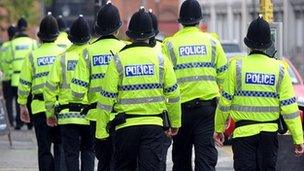Police to be balloted on right to strike
- Published

The federation said the ballot would take place as soon as possible
Police officers in England and Wales are to be balloted on whether they want to be given the right to strike, the Police Federation has said.
Police officers are currently banned by law from taking industrial action.
The ballot of 135,000 members follows 20% budget cuts and proposals for the most wide-ranging reform of pay and conditions in more than 30 years.
A rally will also be held in May to "highlight the unprecedented attack on policing by this government", it said.
The federation said it would explore all the consequences, including the legal position, of police officers obtaining full industrial rights.
The national committee, which voted unanimously for the move, also called on the home secretary to reject Tom Winsor's proposed reforms on pay and conditions which was published last week.
New legislation
The rally is planned to take place before the Police Federation annual conference in May.
"In order that police officers, families, friends and supporters can show their strength of feeling against the budget cuts being applied to policing and the consequences for public safety," the statement said.
The Police Federation last took similar action in May 2008, when it surveyed its membership, asking: "in the absence of binding arbitration would you like the Federation Executive to 'lobby' for the right to strike?" Some 87% of its 60,000 responses were in favour.
Any change in the industrial rights for police officers would require primary legislation.
The Winsor review, which affects only England and Wales, said chief constables should have powers to make police officers compulsorily redundant to cut costs. At present they can do this only if police have served for 30 years or more.
Some staff associations saw the absence of the right to strike as the reason why a protection from compulsory redundancy was needed, Mr Winsor said.
But he said that the inability to strike did not necessary carry with it an immunity from compulsory redundancy - citing the armed forces, where compulsory redundancy did occur.
A Home Office spokeswoman said: "We must tackle the deficit and police forces need to play their part in making savings. We believe this can be done while protecting frontline services, but as with other public services pay restraint is a necessary part of this.
"We will consider the proposals of the independent Winsor review carefully, ensuring that the remuneration and status of police officers continues to reflect the important work they do."
- Published15 March 2012
- Published9 January 2012